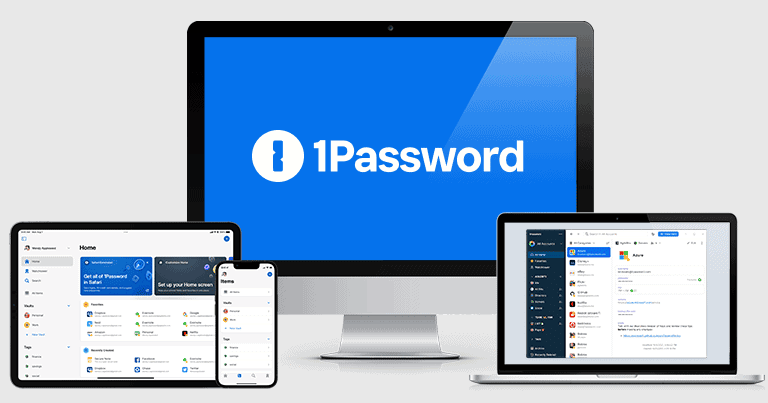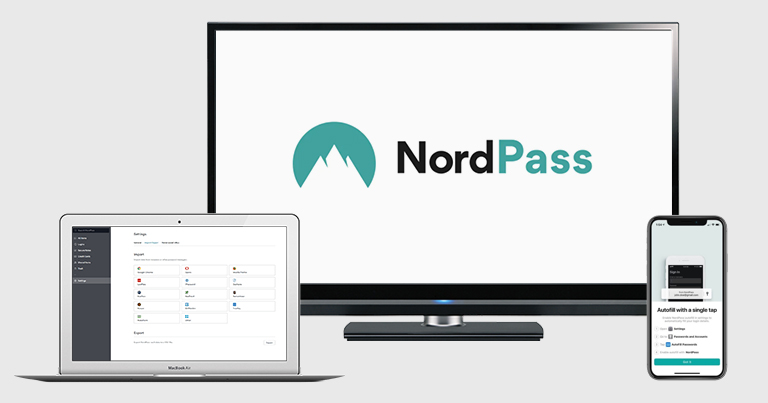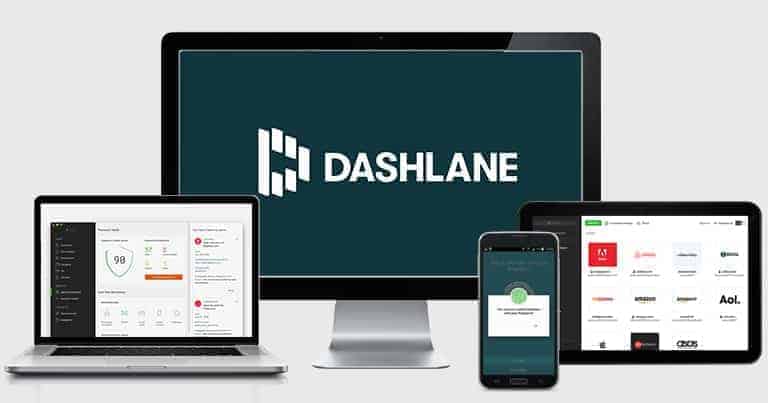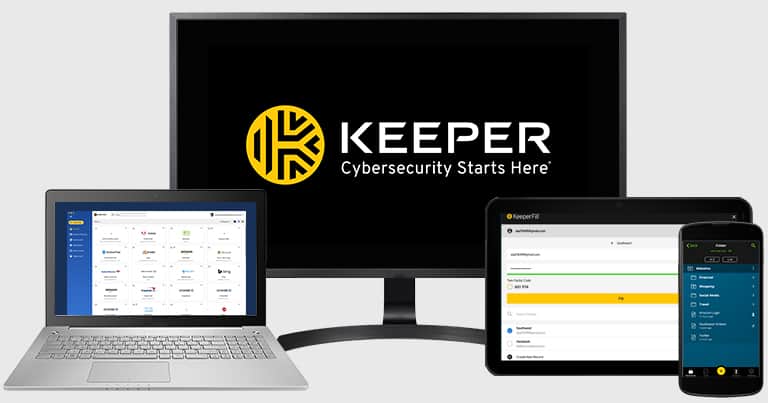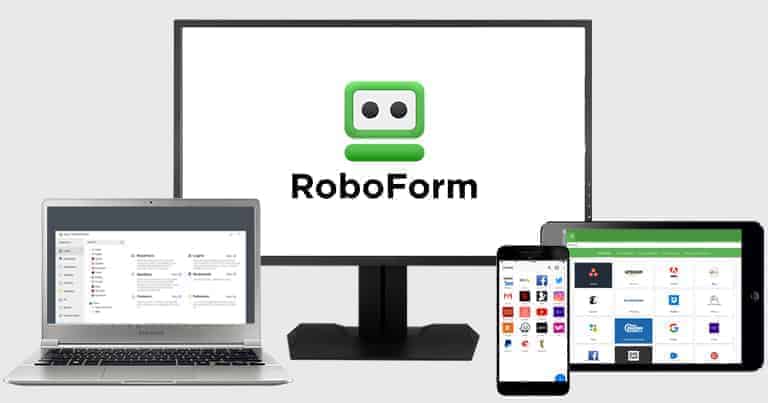
Updated on: January 7, 2025
Short on time? Here’s the best password managers for seniors in 2025:
- 🥇 1Password : Super easy to install and use, with excellent security and tons of useful features, like password auditing, dark web monitoring, secure password sharing, hidden vaults, and encrypted storage, all at a low price.
Managing passwords can undoubtedly be a headache, especially if you’re elderly and struggle with remembering complex passwords or managing multiple accounts. It might even be tempting to write passwords down in a notebook, but you run the risk of them being lost or stolen.
That’s why I tested the most popular password managers on the market. I wanted to find the most senior-friendly apps that can keep your passwords secure, without the risk of losing them. Each app on this list has straightforward navigation, requires minimal effort, and provides good customer support, allowing seniors to access their online accounts without effort.
The brands on my list combine excellent security features with intuitive interfaces and useful extras like encrypted storage, password vault auditing, and account breach monitoring. My top pick is 1Password — it offers a secure, simple, and user-friendly interface with a wide range of security features.
Quick Summary of the Best Password Managers for Seniors
🥇1. 1Password — Overall Best Password Manager for Seniors
1Password is the best password manager for seniors in 2025. Its interface is incredibly user-friendly, whether you’re on Windows, Mac, or smartphone. In fact, my non-tech-savvy parents were able to set up their accounts and navigate the features with ease (though I did assist them with the Emergency Kit during the initial mobile setup).
On top of that, 1Password’s website has excellent step-by-step guides covering every feature. It also has a YouTube channel full of helpful tutorial videos. When I introduced my parents to 1Password, I showed them a tutorial video on using the auto-fill feature. After that, every time they encountered a login field, they immediately recognized the 1Password logo pop-up, ready to either auto-fill their saved passwords or generate a brand new secure password.
1Password’s built-in templates are really useful for securely storing and managing personal information. These templates made it really easy for my mom to add info like her health insurance details and prescriptions, ensuring that all her important info was organized and accessible. NordPass offers templates, too, but not nearly as many as 1Password.
1Password also comes with useful additional features, like:
- Watchtower (vault auditing & breach monitoring).
- Travel Mode (hidden vaults).
- Family vault sharing (Families plan).
- Passkey authentication.
- Account recovery (Families plan).

I really like that 1Password has a desktop app. My mom found it easy to access all features through it, rather than having to switch between the browser extension and web app. It’s also very easy to check for weak, compromised, or repeated passwords using the Watchtower feature.
Plus, 1Password has an account recovery option (Families plan), which is very useful if you forget your master password — it lets you recover your account in just a few simple steps.
I really like 1Password’s Privacy Cards, too. It allows you to create virtual payment cards that can be used instead of your real credit card for safer online shopping. My dad liked that he could shop online and still keep his credit card details private.
1Password Individual includes all the features for only $2.99 / month. 1Password Families, which is my favorite family plan on the market, covers 5 users and provides permission management, shared vaults, and account recovery tools for $4.99 / month. 1Password Families also gives you the option to add additional members for a small fee — something no other brand offers. While 1Password doesn’t offer a money-back guarantee, it offers a 14-day free trial to help you decide whether it’s what you’re looking for.
Bottom Line:
1Password is a very secure and feature-rich password manager and comes with an intuitive interface that makes it easy to use all of its extensive features like Travel Mode, Watchtower, and email masking. With plans suitable for individuals and families, and the option to explore its full range with a 14-day free trial, it’s an excellent choice for seniors.
Read the full 1Password review
🥈 2. NordPass — Straightforward Interface + Future-Proof Encryption
NordPass is a top choice for seniors looking for a password manager that’s both easy to use and very secure. It uses future-proof encryption to keep your data safe, similar to the kind banks use.
During my tests, NordPass did a great job of quickly recognizing and auto-filling saved passwords as well as securely storing sensitive information. The password generator is also very easy to use and lets you create strong passwords. My mom really loved the passphrase option, which is great for creating passwords that are both strong and easy to remember.
She also really liked how easy the desktop app was to navigate, and she could easily add me as an emergency contact — other password managers like Dashlane don’t come with a desktop app and rely on browser extensions (which could get confusing for elderly people).
NordPass also comes with many other security features like:
- Password health checkup tool.
- Data breach monitoring.
- Email masking.
- Secure file storage and attachments (3 GB).
- Passkey support.

I was really impressed with NordPass’s dark web monitoring — it checks if your data has been compromised and provides real-time notifications and detailed breach reports. And, the password health checker alerts you to weak, and reused passwords. However, I wish it had an overall password health score like competitors like 1Password do.
NordPass also offers email masking — this feature made it easy for my mom to keep her email address private when signing up for online services. On top of that, there’s no need for any extra subscriptions or setup — everything you need is already included in your NordPass plan.
NordPass Free offers unlimited password storage on multiple devices, but it only allows you to log into 1 device at a time. Upgrading to NordPass Premium ($1.43 / month) gives you unlimited simultaneous device connections, password sharing, password health checker, data breach monitoring, emergency access, and a lot more. NordPass Family has all the features of Premium but expands its coverage for up to 6 users and costs $2.68 / month. All of NordPass’s plans come with a 30-day money-back guarantee, and there’s a 30-day free trial on the Premium plan.
Bottom Line:
NordPass is a fantastic choice for seniors — it has a straightforward interface and top-notch security. It’s got everything you need to manage your passwords easily and securely, plus you can try it out with a free 30-day trial and rest easy knowing there’s a 30-day money-back guarantee.
🥉 3. Dashlane — Best Extra Features (Including Secure VPN)
Dashlane is another great pick for the elderly with an intuitive interface. I found it super easy to generate and store new passwords, auto-fill logins, and share passwords with other users.
However, Dashlane lacks a dedicated desktop app, relying instead on a web-based interface and browser extensions. Transitioning between browser extensions and web interfaces might be confusing for some seniors compared to the straightforward nature of a desktop app. Additionally, Dashlane doesn’t offer emergency access, which is a significant drawback for elderly users who want to ensure trusted contacts can access their accounts in case of an emergency.
Dashlane also provides valuable extra features, such as:
- VPN.
- Dark web monitoring.
- Password strength checker.
- Multiple account recovery options.
- Passkey authentication.

Dashlane is also the only password manager to offer a VPN — it’s powered by Hotspot Shield and comes with 256-bit AES encryption, a kill switch, and a strict no-logging policy. While not as feature-rich as the best standalone VPNs, it offers fast connection speeds and provides an additional layer of privacy. My mom appreciated the peace of mind knowing her online activities were private and secure, especially when handling sensitive information or connecting to public Wi-Fi.
I found Dashlane’s anti-phishing feature to be very useful, too. When my dad was shopping online, Dashlane stopped him from visiting a suspicious web address made to look like Amazon.
I particularly like Dashlane’s dark web monitoring, too — it has a team of live agents that scans hacking forums and the dark web, alerting you if any data has been breached. It showed that 5 of my mom’s accounts were compromised and she could quickly go in and change those passwords.
Dashlane offers one of the best free plans, with 25 passwords on a single device. It also includes 1 GB encrypted file storage, password sharing with an unlimited number of users, and password auditing. Dashlane Premium ($4.99 / month) provides unlimited passwords across unlimited devices and has all of Dashlane’s security features, including phishing protection and a VPN. Dashlane Friends & Family has all the features of Premium and adds a family management dashboard and coverage for 10 separate vaults for $7.49 / month. All of Dashlane’s plans come with a 30-day money-back guarantee, and there’s also a 30-day free trial.
Bottom Line:
Dashlane is intuitive and has many useful features — like live dark web monitoring, password auditing, and a VPN. All Dashlane plans come with a risk-free 30-day money-back guarantee and a 30-day free trial.
4. Keeper — Highly Secure Password Manager With Unique Features
Keeper is one of the most secure password managers on the market. On top of that, it has a clean, modern, and well-organized interface and many useful features and tools to enhance senior’s password security, including:
- Password security auditing.
- Dark web monitoring (as paid add-on only).
- Encrypted file storage.
- Passkey support.
- KeeperChat (an encrypted messaging app).
Keeper’s desktop app is very user-friendly making it easy to save and share passwords and the emergency access feature lets trusted contacts step in during emergencies, giving everyone involved extra peace of mind.

I also like KeeperChat — a cool feature which allows for secure communication, with options to create self-destructing and retractable messages. That said, my mom was pretty disappointed to find out that she could only use KeeperChat to speak to other people who had a Keeper subscription.
I found Keeper’s dark web monitoring to be very good. However, Keeper only offers it as a paid add-on, unlike other password managers like 1Password and Dashlane, which is a bit annoying.
Keeper Free is pretty limited compared to free plans from competitors like Dashlane and RoboForm — you can only use it on a single mobile device with a 10 record limit, and it lacks password auto-fill. Keeper Personal offers unlimited password storage across unlimited devices, MFA, password sharing, emergency access, an encrypted messaging app, and more for $2.92 / month. Keeper Family costs $6.25 / month and adds 5 licenses and 10 GB encrypted storage. You can also get extras, such as dark web monitoring and up to 100 GB of cloud storage for an additional cost. You can try Keeper risk-free using a 30-day free trial.
Bottom Line:
Keeper provides an easy-to-use password manager with powerful security features, password sharing and auditing, secure storage, user-friendly apps, and seamless integrations across all platforms. While the free plan is limited and can only be accessed on a single mobile device, its premium plans offer many extras, from password sharing to a secure messaging app. You can try Keeper risk-free using a 30-day free trial.
5. RoboForm — Budget Friendly With an Excellent Form Filler
RoboForm is highly secure, easy-to-use, and has the best form-filling capabilities on the market.
Although RoboForm’s interface may not be as intuitive as the other password managers on the list, my parents had no trouble understanding and using its form-filler. Unlike other password managers they tried, it easily and accurately filled out all of their information onto various complex online forms, including those for medical, banking, and shopping.
What makes the form-filler stand out is its ability to handle multiple fields, complex entries, and various form formats seamlessly. During my tests, we were also able to easily set up 2FA, share logins with other RoboForm users, audit the entire password vault, and grant emergency access to trusted contacts.
RoboForm also provides the following extras:
- Password vault auditing.
- Bookmark storage.
- Password and note sharing.
- Emergency access.

One of RoboForm’s coolest features is the bookmarks storage, which saves bookmarks to any device with RoboForm installed on it. My dad was very impressed with this feature, as he was able to easily access important links on both his phone and computer.
That said, RoboForm offers pretty basic data breach monitoring that uses the free “Have I Been Pwned?” database for breach alerts rather than comprehensive dark web monitoring. I much prefer the way Dashlane alerts users in real time about new breaches associated with their accounts.
RoboForm Free includes unlimited password storage, form-filling, password auditing, bookmarks storage, password sharing, 2FA, and cloud backup for a single device. The paid plans are well priced. RoboForm Premium, costs $0.99 / month and adds emergency access, cloud backup on unlimited devices, syncing across all devices, and priority support. RoboForm Family ($1.59 / month) includes all the features of the Premium plan and adds licenses for up to 5 users. RoboForm comes with a 30-day free trial and 30-day money-back guarantee.
Bottom Line:
RoboForm is a budget-friendly password manager with the best form-filling capabilities on the market. It also has a very user-friendly interface and impressive extras like bookmark storage. RoboForm Free comes with a 30-day free trial of the Premium plan, and all RoboForm purchases have a risk-free 30-day money-back guarantee.
Quick Comparison Table
Testing Methodology: Comparison & Ranking Criteria
To find the best password managers for seniors, I relied on our comprehensive testing methodology, which evaluated each product against several key criteria. My goal was to find solutions that combine strong security with easy-to-use interfaces and features tailored to the needs of older users. Here’s an overview of the areas I focused on during my evaluation:
- I assessed ease of use across all platforms. A password manager for seniors should be easy to install and provide a user-friendly interface and apps for all major platforms. I tested each of my top picks to ensure that they are simple to use, but I was particularly impressed with NordPass in this area.
- I tested customer support responsiveness and resource availability. I assessed the availability and quality of customer support — crucial for seniors who may require more assistance. This included checking whether support was available through multiple channels such as phone, email, and live chat.

- I tested the security and encryption standards. I examined the encryption methods used by each password manager, ensuring they offer bank-grade security, typically 256-bit AES, along with a zero-knowledge policy to protect users’ data from unauthorized access — including by the service’s own staff.
- I evaluated the core password management functionalities. I assessed how well each tool handled essential features like storing passwords securely, auto-filling login fields, capturing new credentials, and generating strong passwords. Those that performed these functions smoothly and reliably, with no glitches or errors, ranked higher, such as 1Password and Dashlane.

- I looked into the additional features offered. Given that seniors might be more vulnerable to cyber threats, I looked for features that add an extra layer of security, such as a VPN, dark web monitoring, two-factor authentication (2FA), and password auditing.
- I analyzed the pricing and value offered. I looked at the cost of each password manager and the features included in their free and paid plans — Those offering the best balance of features and fair upgrade pricing like RoboForm and NordPass were rated favorably.
Top Brands That Didn’t Make the Cut
- Bitwarden. Bitwarden is a decent open-source password manager with good security. However, my parents found it harder to navigate and sharing passwords proved more difficult than with the other password managers on my list.
- LogMeOnce. While LogMeOnce offers a strong security and useful set of features, it has a cluttered interface and is less intuitive than the password managers on my list — the overall design choices make it a poor fit for seniors.
- KeePass. KeePass is a very secure open-source password manager. However, I found it very difficult to use — its interface was rather unattractive and lacked an intuitive design. Also, it lacks the useful additional features and the helpful support options that you get with all the brands on my list.
Frequently Asked Questions
Is it safe to trust a password manager with all of my passwords?
Absolutely, it’s safe to use reputable password managers. They use advanced encryption methods, like 256-bit AES, which are also used by banks and governmental institutions to protect data. Furthermore, most password managers operate on a zero-knowledge protocol, meaning they can’t access or view your data themselves.
How can I help my elderly family members manage their passwords?
You can help your elderly family members by introducing them to a user-friendly password manager such as 1Password. This tool stores all their passwords in one secure location, requiring them to remember only one master password. This simplifies their digital life significantly, making it easier to access services like online banking and entertainment platforms without the stress of remembering multiple passwords.
Do password managers track or sell my information?
No, trustworthy password managers don’t track or sell your information. They are designed to prioritize user security and privacy, implementing zero-knowledge protocols that encrypt data before it’s stored. This means only you can access your information, not even the password manager company has the capability to view your data, ensuring complete confidentiality and safety.
